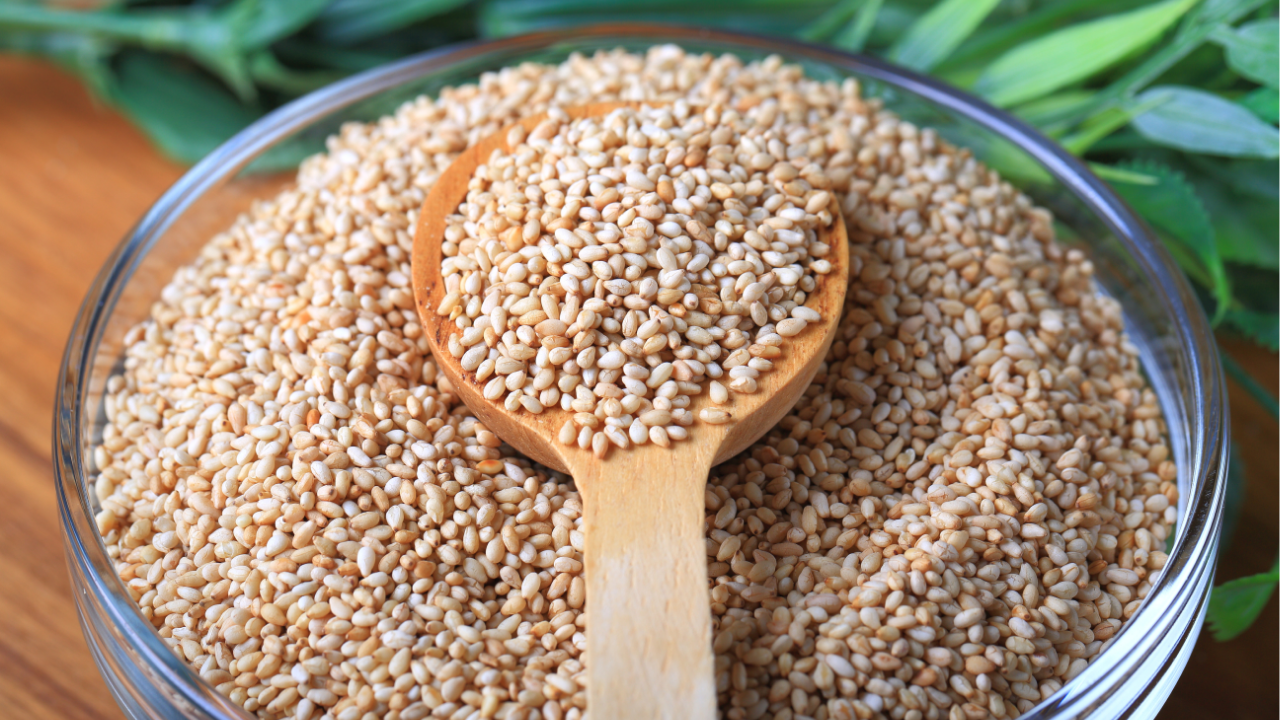Sesame seeds, small and often overlooked, are nutritional powerhouses that have been a part of human diets for thousands of years. These seeds, available in various forms such as raw, toasted, or ground into tahini, provide numerous health benefits. Here are ten compelling reasons why sesame seeds are good for you.
Are Sesame Seeds Good for You?
1. Rich in Nutrients
Sesame seeds are packed with essential nutrients including vitamins, minerals, and healthy fats. They are particularly high in copper, manganese, calcium, and magnesium. These nutrients are vital for maintaining healthy bodily functions, such as bone health and enzymatic activity.
Additionally, sesame seeds contain significant amounts of B vitamins, which are crucial for energy production and maintaining healthy blood cells. Including sesame seeds in your diet can help ensure you are getting a broad spectrum of nutrients necessary for overall well-being.
2. High in Antioxidants
Antioxidants are compounds that help fight oxidative stress and reduce inflammation in the body. Sesame seeds are rich in antioxidants, including sesamol and sesaminol, which have been shown to protect cells from damage.
The antioxidants in sesame seeds can help reduce the risk of chronic diseases such as heart disease, cancer, and neurodegenerative disorders. Regular consumption of sesame seeds can contribute to a healthier immune system and better overall health.
3. Supports Heart Health
Sesame seeds contain lignans, phytosterols, and unsaturated fats that can benefit heart health. These compounds help reduce cholesterol levels and improve lipid profiles, thereby lowering the risk of heart disease.
In addition, the magnesium content in sesame seeds helps to regulate blood pressure, while the high fiber content aids in maintaining healthy cholesterol levels. By incorporating sesame seeds into your diet, you can support cardiovascular health and reduce the risk of heart-related issues.
4. Promotes Bone Health
Sesame seeds are an excellent source of calcium, a mineral essential for bone health. Just a handful of these seeds can provide a significant portion of your daily calcium needs, which is crucial for maintaining strong bones and teeth.
Besides calcium, sesame seeds are rich in other bone-strengthening minerals like phosphorus, zinc, and magnesium. These minerals work together to enhance bone density and prevent conditions like osteoporosis, making sesame seeds an important addition to a bone-healthy diet.
5. Aids in Digestion
The high fiber content in sesame seeds makes them great for digestion. Dietary fiber is essential for maintaining a healthy digestive system, as it helps to regulate bowel movements and prevent constipation.
Fiber also supports a healthy gut microbiome by acting as a prebiotic, feeding beneficial bacteria in the intestines. By improving digestion and promoting a balanced gut flora, sesame seeds can help enhance nutrient absorption and overall gut health.
6. Boosts Immune System
Sesame seeds are rich in zinc, a mineral that plays a crucial role in maintaining a healthy immune system. Zinc is necessary for the development and function of immune cells, and a deficiency in this mineral can lead to a weakened immune response.
In addition to zinc, sesame seeds contain other immune-boosting nutrients such as selenium and copper. Regular consumption of sesame seeds can help ensure your immune system remains strong and effective in fighting off infections and illnesses.
7. Improves Skin Health
The nutrients found in sesame seeds, particularly zinc and vitamin E, are beneficial for skin health. Zinc helps in the production of collagen, which is essential for maintaining skin elasticity and preventing wrinkles.
Vitamin E acts as a powerful antioxidant, protecting the skin from damage caused by free radicals and UV exposure. Including sesame seeds in your diet can help improve skin texture, hydration, and overall appearance, making them a natural ally for skincare.
8. Enhances Hair Growth
Sesame seeds are known to promote healthy hair growth due to their high content of essential fatty acids, vitamins, and minerals. The presence of B vitamins, particularly biotin, supports hair strength and growth.
Additionally, the oils in sesame seeds can help to moisturize the scalp and prevent dryness, which is essential for maintaining healthy hair follicles. Regular intake of sesame seeds can lead to stronger, shinier, and healthier hair.
9. Supports Hormonal Balance
Sesame seeds contain lignans, which have estrogenic properties. These compounds can help balance hormones in the body, particularly in women going through menopause. They may help alleviate symptoms such as hot flashes and mood swings.
Furthermore, the healthy fats and amino acids in sesame seeds support the production of hormones, contributing to overall hormonal health. Including sesame seeds in your diet can help maintain a balanced hormone level, promoting better health and well-being.
10. Aids in Weight Management
Despite being high in healthy fats, sesame seeds can aid in weight management. The fiber content helps you feel full longer, reducing overall calorie intake. Fiber also aids in regulating blood sugar levels, preventing spikes and crashes that can lead to overeating.
Moreover, the protein in sesame seeds helps to build and repair muscles, which can increase metabolism and support weight loss efforts. By incorporating sesame seeds into a balanced diet, you can effectively manage your weight and improve your overall health.
Conclusion
Incorporating sesame seeds into your diet can offer a multitude of health benefits, from improved heart health to better digestion and enhanced skin and hair. These tiny seeds are a versatile and nutritious addition to any meal, making them an easy and effective way to boost your overall well-being. Whether sprinkled on salads, blended into smoothies, or used as a topping for various dishes, sesame seeds can help you lead a healthier, more balanced life.

